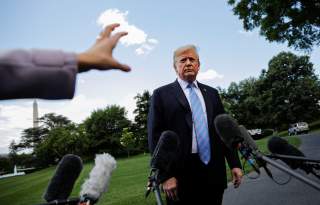President Trump's War Power Delusions
Donald Trump claims that he has right to unilaterally and irresponsibly go to war at his discretion. His aides appear to be creatively justifying that stance.
Geltzer, Goodman, and Hartig added: “presence in the form of house arrest seems even less like ‘harboring,’ given the constraints imposed on such terrorists. And in some cases, Iran has gone even further, as when they extradited a key Al Qaeda operative to Mauritania in 2012.” An administration official admitted to Time: “The secretary has blown the level of collusion between Iran and a few of the remnants of Al Qaeda way out of proportion.” The official added that “there have been occasional marriages of convenience, but there is nothing in the intelligence to suggest that any of them has been consummated in any grand anti-American alliance.” Benjamin observed that Tehran’s position “maintained for many years has been to avoid anything that would provoke an American strike.”
The most the State Department’s yearly terrorism assessment could state was the refusal “to bring to justice senior [Al Qaeda] members residing in Iran.” This is hardly surprising. U.S. hostility rose over time—after the invasion of Iraq, some Neoconservatives were advocating an attack on Iran as the next step. That appears to have caused Tehran to adjust its attitude and allow some Al Qaeda operatives to stay in Iran as long as they were not involved in terrorist activities. George W. Bush’s Afghanistan envoy, James Dobbins, noted: “I don’t think there was ever any evidence of active collaboration or support from Iran.”
This “connection,” as Pompeo called it, both reduces the likelihood of the group targeting Tehran and provides possible leverage in future negotiations with America. The official told Time: “that’s kind of the opposite of what the secretary has said.”
Moreover, the “connection” appears to have fallen. Seth Jones, a political scientist at the Center for Strategic and International Studies, said that: “We are at the lowest point since 9/11 in terms of Al Qaeda numbers in that country. The numbers I have looked at suggest it’s less than five” people. Jones said there has been no change as tensions between Washington and Tehran increased.
As for financial support, America’s allies have always been the biggest problem. Until the organization was foolish enough to attack the royal family, Riyadh tolerated its citizens underwriting Al Qaeda. For instance, the Treasury Department concluded that the Saudi-based International Islamic Relief Organization backed terrorist groups, including Al Qaeda, from the 1990s “through to at least the first half of 2006.” More broadly, as part of the al-Saud family’s deal with the Saudi clergy, the Kingdom subsidizes Wahhabism, the intolerant Salafist theology which demonizes “the other” and serves as a precursor to terrorism. The Brookings Institution’s William McCants called the Saudis “both the arsonists and the firefighters.”
More recently, the Saudis and Emiratis supported radical Islamist insurgents in Syria, including Al Qaeda’s affiliates. In Yemen, Riyadh and Abu Dhabi are aiding former president Abdrabbuh Mansur Hadi, who has allied with Al Qaeda in the Arabian Peninsula, which is the most virulent national offshoot of Al Qaeda. Moreover, Amnesty International reported that “compromises and alliances have allowed Al Qaeda militants to survive to fight another day—and risk strengthening the most dangerous branch of the terror network that carried out the 9/11 attacks.” Using Pompeo’s rationale, the United States should be at war with its supposed allies against Iran.
The administration even more bizarrely cited Iranian aid to the Taliban as a possible casus belli while the Pentagon has cited infantry training and weapons transfers. Jones noted “limited lethal assistance” to the insurgents for years, even while maintaining “reasonable relations with the Afghan government.” But this sort of aid has nothing to do with the 2001 AUMF, which related to helping those involved in 9/11, which the Taliban was not.
Moreover, the closer relationship reflects Washington’s increasingly hostile campaign against Iran, which long had been at odds with the Taliban government. Iran almost attacked the Taliban in 1998 after the attack on the Iranian consulate and helped broker the new, U.S.-backed government after the Taliban’s ouster. Newsweek’s Maziar Bahari reported on being told by an Iranian official “We wanted to truly condemn the attacks, but we also wished to offer an olive branch to the United States, showing we were interested in peace.” However, soon thereafter came George W. Bush’s “axis of evil” speech and rejection of Tehran’s offer to talk.
In contrast, if assisting the Taliban warranted war, the United States should have bombed Pakistan then and now, since the latter assisted the Taliban for years. And aiding insurgents with lethal aid is precisely what Washington did for the Mujahedeen against the Soviets and various groups against the Syrian government. Treating that as justification for war might be a precedent Washington would soon regret.
Attacking Iran would be a bad policy judgment, inexplicable for a president who declared that great powers don’t fight “endless wars.” Attacking Iran without congressional authorization also would be illegal. If President Trump really wants to make a mark, then he should be the first president in years to follow the Constitution and the letter of the law when it comes to making war.
Doug Bandow is a senior fellow at the Cato Institute and a former special assistant to President Ronald Reagan. A graduate of Stanford Law School and a member of the California and DC bars, he is the author of Foreign Follies: America’s New Global Empire.
Image: Reuters

